The Life and Death of Lucy the Sow
 Print This Post
Print This Post
By Nina Prater, NCAT Agriculture Specialist
“Farms are businesses,” we at ATTRA often say at workshops or webinars. If you want to succeed, you have to treat it like a business: keep records, watch your cash flow, pay attention to things like depreciation, be financially savvy on several fronts. And of course this is true. Unless you are independently wealthy and can spend infinite funds on farming, farms and ranches have to be economically sustainable.
But I think it is telling that we have to consistently remind people of this. It is obvious that a grocery store is a business, that an insurance company is a business, so why is it that we must remind farmers themselves that farming is a business? I honestly don’t know the answer. Is it because the lines between farm life and home life are blurry? Is it because farming is a “calling”? Is it because it is so integrated with the natural environment that it resists being made into a “pure” business like factories or retail?
To me, the word business implies the necessity to make only cool-headed financial decisions. If hens are no longer laying at a certain rate, they are immediately sold or turned into stew meat. If it is more profitable to raise only one crop rather than a diverse array of crops, then monocrop rather than diversify. I suspect this mindset is what has led to the predominantly industrialized agricultural landscape of today – building farms around business efficiency rather than around ecological concerns, quirks of the landscape, biodiversity, or even around the pleasures of a rural landscape. Mulberries and pecans that used to dot fencerows and provide shade and forage for wildlife and humans have been lost to the efficiency of crop dusters spraying herbicides.
I ponder this topic because my husband and I started out 15 years ago thinking we were going to be very smart businesspeople on the small farm we are privileged enough to live on. But we found that we couldn’t be as cool-headed or hard-hearted as we thought. One example: for several years we had a farrow-to-finish hog operation and when that stopped making financial sense, we sold out and moved on (a smart business decision for sure). However, we were unable to sell or process Lucy, our very first sow that we bought when our oldest child was a baby. She was our first sow and gave us countless litters of piglets that we raised, processed, and sold at the farmers market. She loved scratches on her back and came running out of the woods when we called her for her meals, grunting her greeting. So, we kept her as an oversized pet, our kids growing from babies to elementary-aged kids as she aged quietly in her grove of cedars and sweetgums.
The first weekend of January 2023, Lucy died in her sleep. I cried when I found out. My son, now 8, born a couple years after we brought Lucy home, insisted he help dig her grave and bury her immense, bristly body. We wrote a poem to read at her funeral. It was sad, and yet it felt good. We gave her a peaceful life after many productive years that came to its quiet, natural end.
And it made me realize the importance of – every now and then – doing something on the farm that is good for the heart. Yes, our farms need to be financially sound but, when possible, I think it is important to acknowledge the human side of things. Years ago, we could have brought Lucy to the processor and turned her into sausage. And I’m not even saying that would have been wrong. But for us, at that time, what we needed to do was to keep Lucy until she naturally left us on her own time. Our decision reminds me of Wendell Berry’s poem, “Manifesto: The Mad Farmer Liberation Front,” from his 1973 book, The Country of Marriage. He writes, “When they want you to buy something / they will call you. When they want you / to die for profit they will let you know. / So, friends, every day do something / that won’t compute.”
Keeping Lucy as a pet pig for several years did not compute. There is no business justification for our decision to do so, except that it kept our hearts happy, and that kept our spirits up, and that kept alive our willingness to work hard through every kind of weather, day in, day out, for very little money. I think being a little bit human and protecting our hearts from becoming mechanized is a critical and under-recognized piece of being small farmers.
So, I encourage you to do something on your farm that won’t compute, at least in terms of quarterly profits: plant that pollinator habitat. Plant the trees that won’t bear fruit or nuts for a decade. Leave timber standing. Raise weird varieties of tomatoes that make you smile, even if they are a little less prolific. Buy a few runner ducks just to watch them walk around like temperate penguins. Take time to walk your land, even if you’re not “accomplishing” anything. It won’t compute right now, but it does add up to a life that is complete, to a landscape that is beautiful and productive, to a business that your grandkids will want to understand. And in the words of Wendell Berry in that same poem, “Expect the end of the world. Laugh. / Laughter is immeasurable. Be joyful / though you have considered all the facts.”
Related ATTRA Resources:
Hogs: Pastured or Forested Production
Looking for On-farm Diversification? Consider Pastured Pigs
A Pictorial Guide to Hedgerow Plants for Beneficial Insects
Agroforestry for Improved Soil Fertility
Other Resources:
The Country of Marriage, by Wendell Berry
This blog is produced by the National Center for Appropriate Technology through the ATTRA Sustainable Agriculture program, under a cooperative agreement with USDA Rural Development. ATTRA.NCAT.ORG.

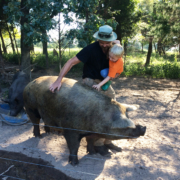
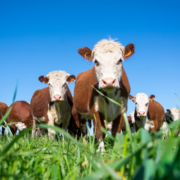
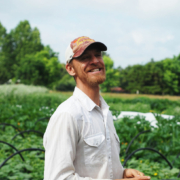

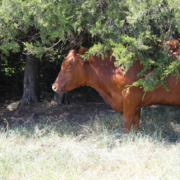
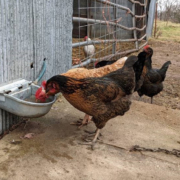
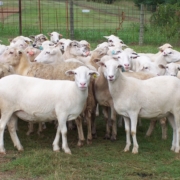
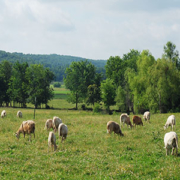
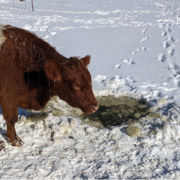
 USDA Photo by Meredyth H. von Seelen.
USDA Photo by Meredyth H. von Seelen.